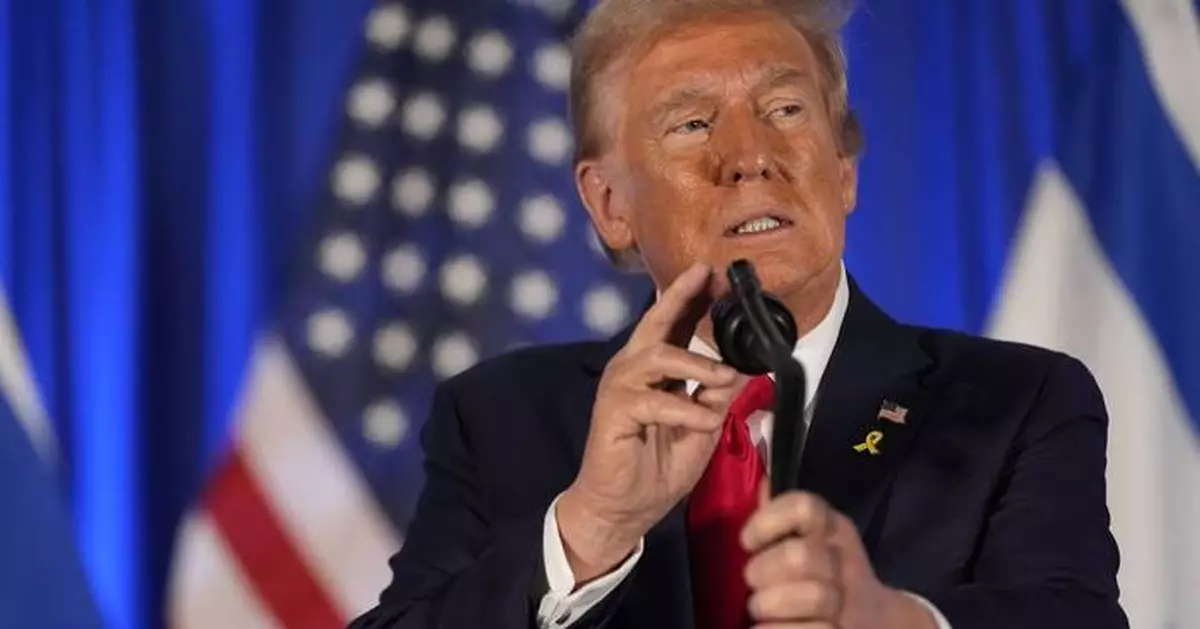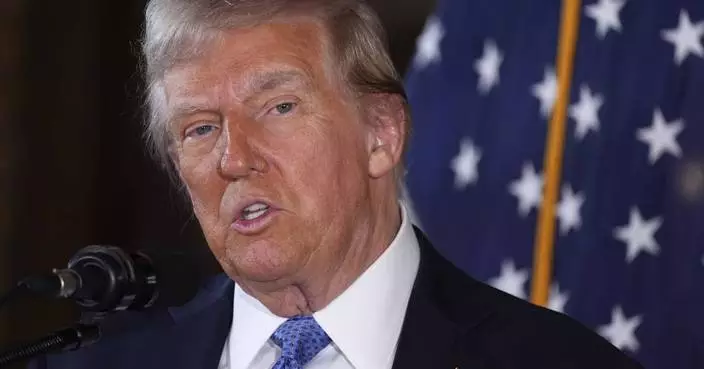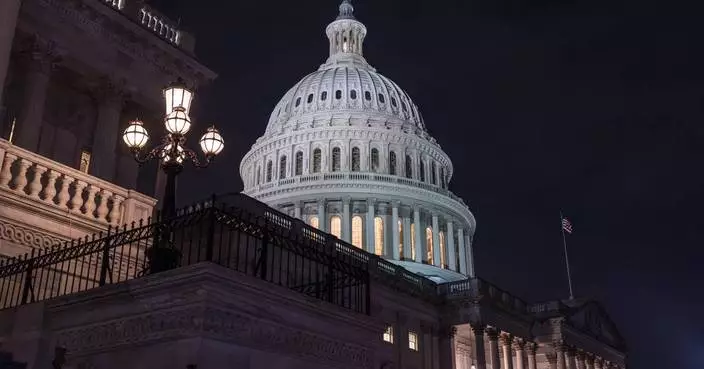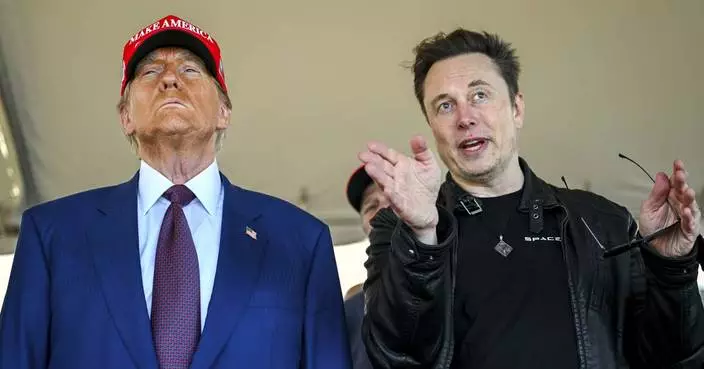WASHINGTON (AP) — Donald Trump has had as many as seven private phone calls with Vladimir Putin since leaving office and secretly sent the Russian president COVID-19 test machines during the height of the pandemic, Bob Woodward reported in his new book, “War."
The famed Watergate reporter also details President Joe Biden's frustrations with Israeli Prime Minister Benjamin Netanyahu and Saudi Crown Prince Mohammed bin Salman 's assortment of burner phones. The Associated Press obtained an early copy of the book, which is due out next week.
Trump denied the reporting, telling ABC News' Jonathan Karl that Woodward is “a storyteller. A bad one. And he’s lost his marbles.”
Trump had previously spoken to Woodward for the journalist's 2021 book, “Rage.” Trump later sued over it, claiming Woodward never had permission to publicly release recordings of their interviews for the book. The publisher and Woodward denied his allegations.
Here is more from the new book:
Woodward reports that Trump asked an aide to leave his office at his Florida resort, Mar-a-Lago, so that the former president could have a private call with Putin in early 2024. The aide, whom Woodward doesn’t name, said there have been multiple calls between Trump and Putin since Trump left office, perhaps as many as seven, according to the book, though it does not detail what they discussed.
Trump senior adviser and longtime aide Jason Miller told Woodward that he had not heard Trump was having calls with Putin and said, “I'd push back on that.” But Miller also said, according to the book, “I’m sure they’d know how to get in touch with each other."
Steven Cheung, Trump’s communications director, said none of the stories in Woodward’s books are true. In a statement on Tuesday, he called them “the work of a truly demented and deranged man who suffers from a debilitating case of Trump Derangement Syndrome.”
Kremlin spokesman Dmitry Peskov said the reporting about the calls was “not true.”
Trump's relationship with Putin has been scrutinized since his 2016 campaign for president, when he memorably called on Russia to find and make public missing emails deleted by Hillary Clinton, his Democratic opponent. “Russia, if you’re listening, I hope you’re able to find the 30,000 emails that are missing,” he said.
U.S. intelligence agencies later determined that Russia had meddled in the 2016 election to help Trump, though an investigation by special counsel Robert Mueller found no conspiracy between the Trump team and Russia. In 2018, Trump publicly questioned that finding following an in-person meeting with Putin in Helsinki.
In recent years, Trump has criticized U.S. support for Ukraine as it fights off Russia’s invasion. He has said Ukraine should have made concessions to Putin before Russia invaded in 2022. He also previously touted his good relationship with Putin and called the Russian leader “pretty smart” for invading Ukraine.
Woodward reports that Trump sent Putin COVID-19 test machines for his personal use as the virus began spreading in 2020.
Putin told Trump not to tell anyone because people would be mad at Trump over it, but Trump said he didn’t care if anyone knew, according to the book. Trump ended up agreeing not to tell anyone.
The book doesn’t specify when the machines were sent but describes it as being when the virus spread rapidly through Russia. It was previously reported by The Associated Press and other agencies that Trump’s administration in May 2020 sent ventilators and other equipment to several countries, including Russia.
“There were no secret shipments. The pandemic was starting back then," Peskov said Wednesday via a messaging app. “Many countries were exchanging equipment. We sent ventilators. Testers came from America.”
Vice President Kamala Harris, in an interview Tuesday with radio host Howard Stern, accused Trump of giving the machines to a “murderous dictator” at a time when “everyone was scrambling" to get tests.
“This person who wants to be president again, who secretly is helping out an an adversary while the American people are dying by the hundreds every day," said Harris, the Democratic presidential candidate.
Biden highlighted the report during a stop in Pennsylvania on Tuesday.
“You see what came out today?” Biden said at a fundraiser for Sen. Bob Casey. “So he calls his good friend Putin — not a joke — and makes sure he had the tests. He had the tests.”
The book also details Biden’s complicated relationship with Netanyahu as well as private moments when the president has been fed up with him over the Israel-Hamas war.
Biden’s “frustrations and distrust” of Netanyahu “erupted” this past spring, Woodward writes. The president privately unleashed a profanity-laden tirade, calling him a “son of a bitch” and a “bad f——— guy," according to the book. Biden said he felt, in Woodward’s accounting, that Netanyahu “had been lying to him regularly.” With Netanyahu “continuing to say he was going to kill every last member of Hamas.” Woodward wrote, “Biden had told him that was impossible, threatening both privately and publicly to withhold offensive U.S. weapons shipment.”
Biden and Netanyahu have long been acquainted, although their relationship has not been known to be close or overly friendly. Last week, Biden said he didn’t know whether the Israeli leader was holding up a Mideast peace deal in order to influence the outcome of the 2024 U.S. presidential election.
Asked about the book's reporting, White House spokesperson Emilie Simons told reporters Tuesday that “The commitment that we have to the state of Israel is ironclad.”
Simons, when pressed on the details, said she wouldn't comment on every anecdote that may come out in reporting. She added of Biden and Netanyahu: “They have a long-term relationship. They have a very honest and direct relationship, and I don’t have a comment on those specific anecdotes.”
The book details Biden’s criticism late last year of President Barack Obama’s handling of Putin’s earlier invasion of Ukraine, when Russia seized Crimea and a section of the Donbas in 2014, at a time when Biden was serving as the Democrat’s vice president.
“They f----- up in 2014,” Woodward wrote that Biden said to a close friend in December, blaming the lack of action for Putin’s actions in Ukraine. “Barack never took Putin seriously.”
Biden was angry while speaking to the friend and said they “never should have let Putin just walk in there” in 2014 and that the U.S. “did nothing.”
Woodward reports Biden was privately furious with Attorney General Merrick Garland for appointing a special counsel to investigate Biden’s son Hunter in a tax-and-gun prosecution.
“Should never have picked Garland,” Biden told an associate, according to Woodward. The journalist did not name the associate.
Hunter Biden was convicted in June on federal gun charges and faces sentencing in federal court in Delaware in December. He pleaded guilty to federal tax charges in California and is also set to be sentenced in that case in December.
The Justice Department declined to comment.
One of Trump’s longest-term allies, South Carolina Sen. Lindsey Graham, blamed Trump’s ongoing false claims that the 2020 election was rigged to a cult of personality in which the former president’s ensconcement at Mar-a-Lago and circle of aides and advisers “constantly feed this narrative,” according to the book.
The weekend after Russia invaded Ukraine, Graham was with Trump at Mar-a-Lago, which the senator characterized as “a little bit like going to North Korea.” Graham added that “everybody stands up and claps every time Trump comes in.”
On politics, Woodward wrote that Graham’s counsel was part of what persuaded Trump to run again for the presidency.
In March, during one of his many visits to the Middle East since Hamas attacked Israel on Oct. 7, Graham told Woodward that he had been meeting with the Saudi crown prince when Graham suggested they call Trump. From “a bag containing about 50 burner phones,” Prince Mohammed “pulled out one labeled ‘TRUMP 45.’” On another trip, Woodward wrote, the Saudi leader retrieved another burner phone, "this time labeled JAKE SULLIVAN ” when the men called Biden’s national security adviser.
Price reported from New York. Associated Press writers Hillel Italie in New York, Eric Tucker and Alanna Durkin Richer in Washington and Aamer Madhani aboard Air Force One contributed to this report.
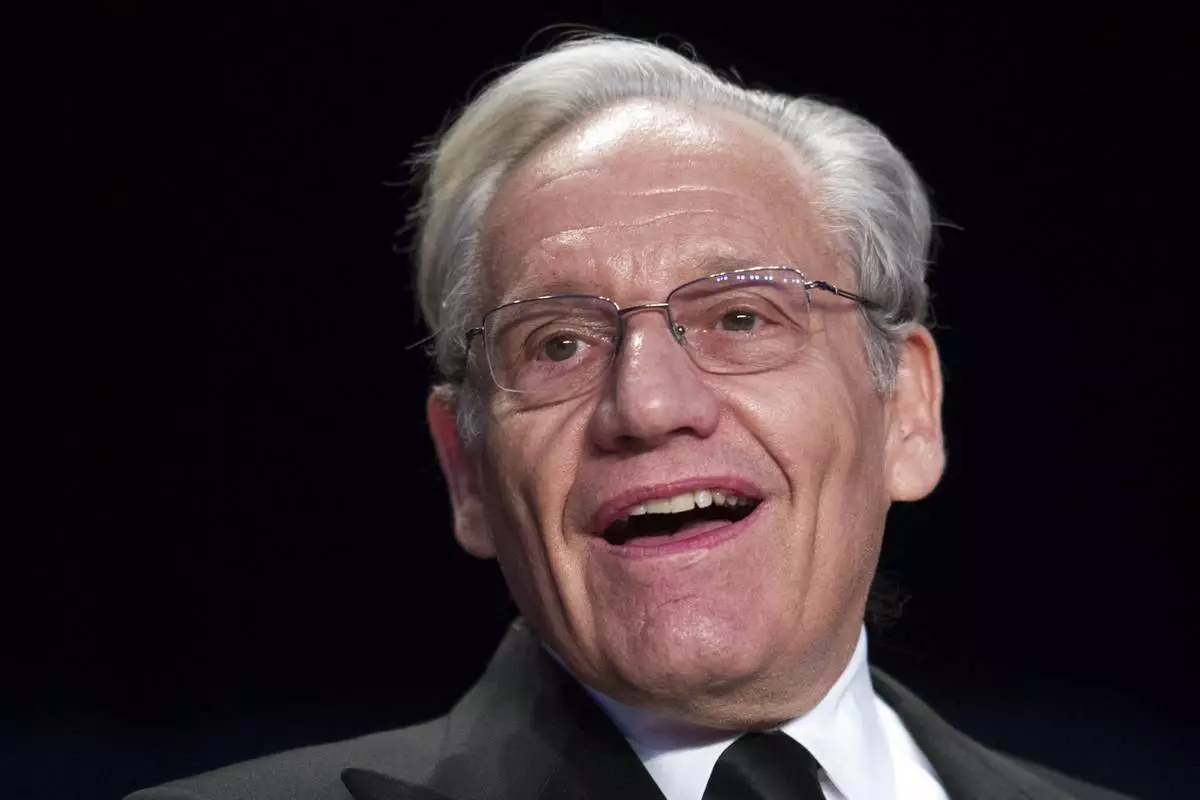
FILE - In this April 29, 2017, file photo journalist Bob Woodward sits at the head table during the White House Correspondents' Dinner in Washington. (AP Photo/Cliff Owen, File)
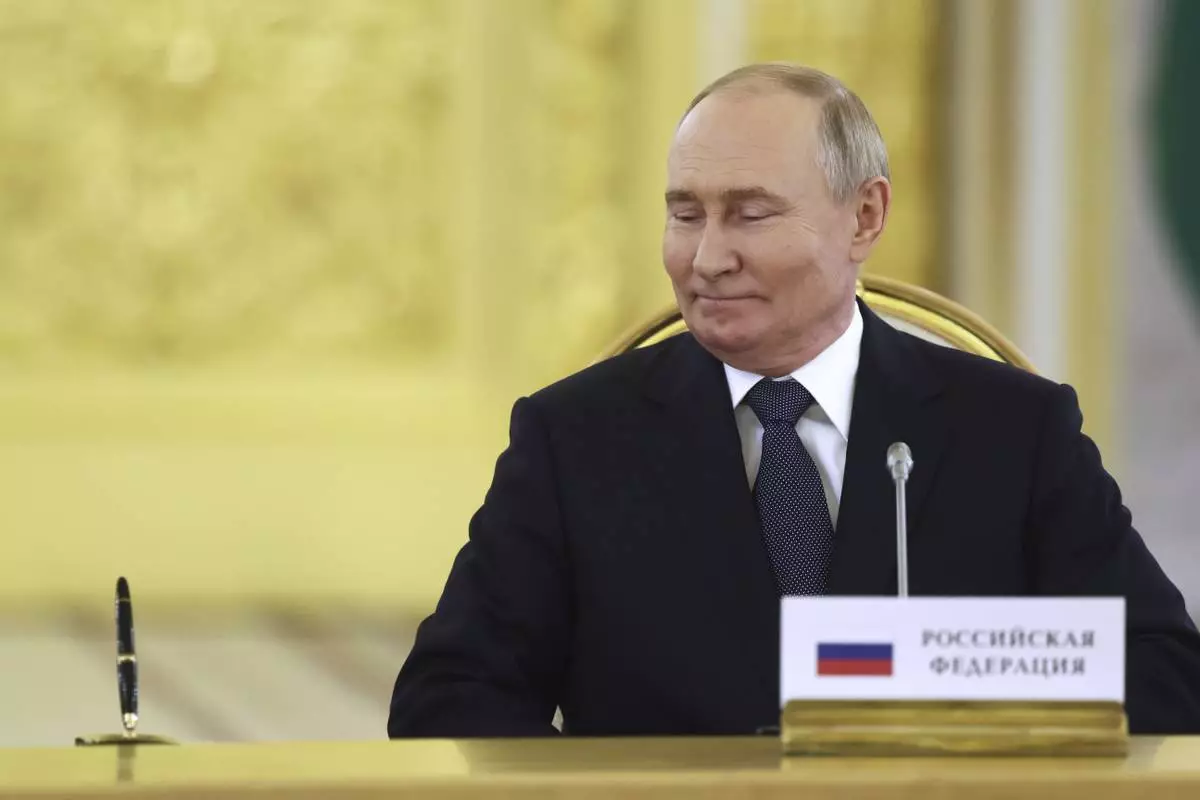
Russian President Vladimir Putin attends an extended meeting during the summit of the heads of state of the Commonwealth of Independent States (CIS) at the Kremlin in Moscow, Russia, Tuesday, Oct. 8, 2024. (Sergei Ilnitsky/Pool Photo via AP)
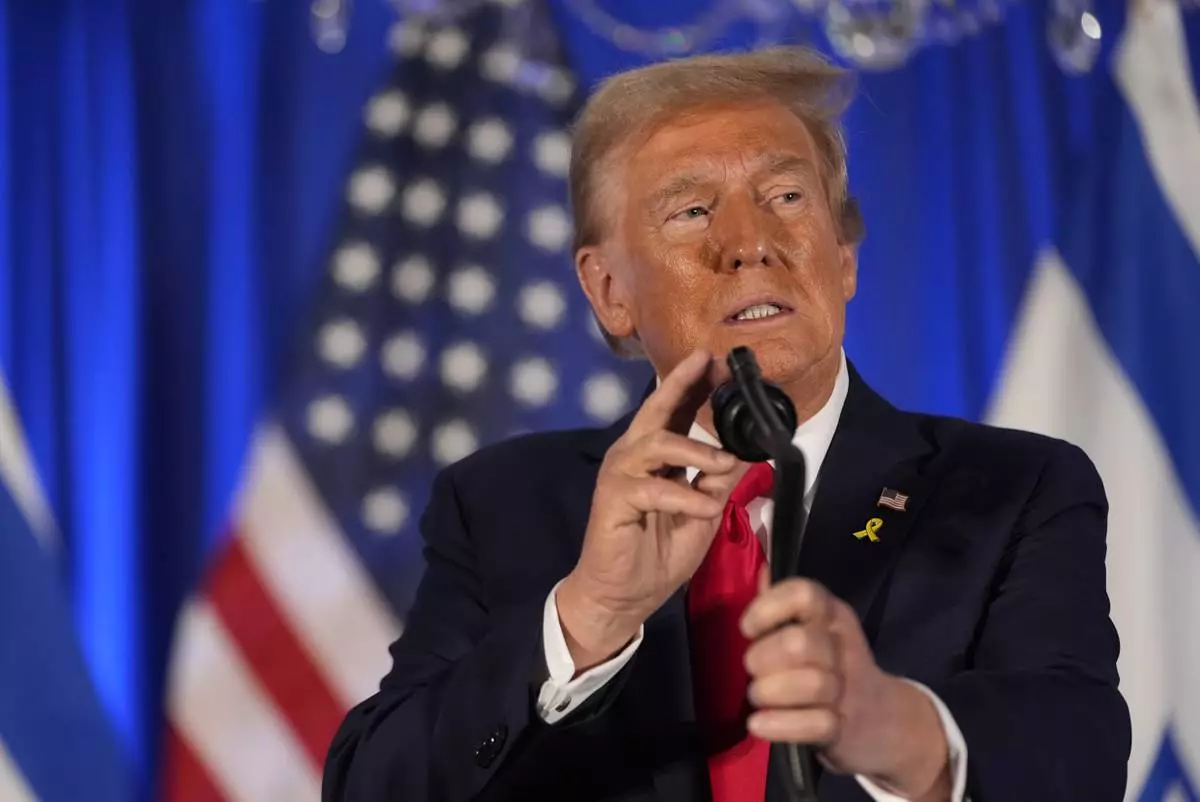
Republican presidential nominee former President Donald Trump speaks at an event marking one year since the Oct. 7 Hamas attack on Israel, Monday, Oct. 7, 2024, in Miami. (AP Photo/Alex Brandon)
MAGDEBURG, Germany (AP) — Germans on Saturday mourned a violent attack and their shaken sense of security after a Saudi doctor intentionally drove a black BMW into a Christmas market teeming with holiday shoppers, killing at least two people, including a small child, and injuring at least 60 others.
Authorities arrested a 50-year-old man at the site of the attack Friday evening and took him into custody for questioning. He has lived in Germany for nearly two decades, practicing medicine, officials said.
Several German media outlets identified the man as Taleb A., withholding his last name in line with privacy laws, and reported that he was a specialist in psychiatry and psychotherapy.
There were still no answers Saturday as to what caused him to drive into a crowd in the eastern German city of Magdeburg.
Describing himself as a former Muslim, he shared dozens of tweets and retweets daily focusing on anti-Islam themes, criticizing the religion and congratulating Muslims who left the faith.
He also accused German authorities of failing to do enough to combat what he said was the “Islamism of Europe.” Some described him as an activist who helped Saudi women flee their homeland. He has also voiced support for the far-right and anti-immigrant Alternative for Germany (AfD) party.
Recently, he seemed focused on his theory that German authorities have been targeting Saudi asylum seekers.
Prominent German terrorism expert Peter Neumann said he had yet to come across a suspect in an act of mass violence with that profile.
“After 25 years in this ‘business’ you think nothing could surprise you anymore. But a 50-year-old Saudi ex-Muslim who lives in East Germany, loves the AfD and wants to punish Germany for its tolerance towards Islamists — that really wasn’t on my radar, " Neumann, the director of the International Centre for the Study of Radicalization and Political Violence at King’s College London, wrote on X.
The violence shocked Germany and the city, bringing its mayor to the verge of tears and marring a festive event that’s part of a centuries-old German tradition. It prompted several other German towns to cancel their weekend Christmas markets as a precaution and out of solidarity with Magdeburg’s loss. Berlin, where a truck attack on a Christmas market in 2016 killed 12 people, kept its markets open but has increased its police presence at them.
Chancellor Olaf Scholz and Interior Minister Nancy Faeser were due to travel to Magdeburg on Saturday, and a memorial service is to take place in the city cathedral in the evening.
“My thoughts are with the victims and their relatives," Scholz wrote on X. "We stand beside them and beside the people of Magdeburg.”
Magdeburg is a city of about 240,000 people, west of Berlin, that serves as Saxony-Anhalt’s capital. Friday’s attack came eight years after an Islamic extremist drove a truck into a crowded Christmas market in Berlin, killing 13 people and injuring many others. The attacker was killed days later in a shootout in Italy.
Verified bystander footage distributed by the German news agency dpa showed the suspect’s arrest at a tram stop in the middle of the road. A nearby police officer pointing a handgun at the man shouted at him as he lay prone, his head arched up slightly. Other officers swarmed around the suspect and took him into custody.
The two people confirmed dead were an adult and a toddler, but officials said additional deaths couldn't be ruled out because 15 people had been seriously injured.
“As things stand, he is a lone perpetrator, so that as far as we know there is no further danger to the city," Saxony-Anhalt's governor, Reiner Haseloff, told reporters. “Every human life that has fallen victim to this attack is a terrible tragedy and one human life too many.”
Authorities identified the suspect as a 50-year-old Saudi doctor who moved to Germany in 2006 and who had been practicing medicine in Bernburg, about 40 kilometers (25 miles) south of Magdeburg.
Saudi Arabia’s foreign ministry condemned the attack on X but did not mention the suspect’s connection to the kingdom.
Christmas markets are a German holiday tradition cherished since the Middle Ages, now successfully exported to much of the Western world.
Hours after Friday's tragedy, the wail of sirens clashed with the market’s festive ornaments, stars and leafy garlands.
Magdeburg resident Dorin Steffen told dpa that she was at a concert in a nearby church when she heard the sirens. The cacophony was so loud “you had to assume that something terrible had happened," she said, calling it "a dark day” for the city.
The attack reverberated far beyond Magdeburg, with Haseloff calling it a catastrophe for the city, state and country. He said flags would be lowered to half-staff in Saxony-Anhalt and that the federal government planned to do the same.
“It is really one of the worst things one can imagine, particularly in connection with what a Christmas market should bring," the governor said.
Aboubakr reported from Cairo and Gera from Warsaw, Poland.

Security guards stand in front of a cordoned-off Christmas Market after a car crashed into a crowd of people, in Magdeburg, Germany, Saturday, Dec. 21, 2024. (AP Photo/Ebrahim Noroozi)

Emergency services work in a cordoned-off area near a Christmas Market, after a car drove into a crowd in Magdeburg, Germany, Saturday, Dec. 21, 2024. (AP Photo/Ebrahim Noroozi)

Emergency services work in a cordoned-off area near a Christmas Market, after a car drove into a crowd in Magdeburg, Germany, Friday, Dec. 20, 2024. (AP Photo/Ebrahim Noroozi)

Emergency services work in a cordoned-off area near a Christmas Market, after a car drove into a crowd in Magdeburg, Germany, Friday, Dec. 20, 2024. (AP Photo/Ebrahim Noroozi)

Reiner Haseloff, Minister President of Saxony-Anhalt, center, is flanked by Tamara Zieschang, Minister of the Interior and Sport of Saxony-Anhalt, left, and Simone Borris, Mayor of the City of Magdeburg, at a press conference after a car plowed into a busy outdoor Christmas market in Magdeburg, Germany Friday, Dec. 20, 2024. (Hendrik Schmidt/dpa via AP)

Emergency services work in a cordoned-off area near a Christmas Market, after a car drove into a crowd in Magdeburg, Germany, Friday, Dec. 20, 2024. (AP Photo/Ebrahim Noroozi)

Emergency services work in a cordoned-off area near a Christmas Market, after a car drove into a crowd in Magdeburg, Germany, Friday, Dec. 20, 2024. (AP Photo/Ebrahim Noroozi)

Emergency services work in a cordoned-off area near a Christmas Market, after a car drove into a crowd in Magdeburg, Germany, Friday, Dec. 20, 2024. (AP Photo/Ebrahim Noroozi)

A police officer guards at a blocked road near a Christmas Market, after an incident in Magdeburg, Germany, Friday, Dec. 20, 2024. (AP Photo/Ebrahim Noroozi)

Emergency services attend an incident at the Christmas market in Magdeburg, Germany, Friday Dec. 20, 2024. (Dörthe Hein/dpa via AP)

Emergency services attend an incident at the Christmas market in Magdeburg, Germany, Friday Dec. 20, 2024. (Heiko Rebsch/dpa via AP)

Emergency services attend an incident at the Christmas market in Magdeburg, Germany, Friday Dec. 20, 2024. (Heiko Rebsch/dpa via AP)

A police officer guards at a cordoned-off area near a Christmas Market after an incident in Magdeburg, Germany, Friday, Dec. 20, 2024. (AP Photo/Ebrahim Noroozi)
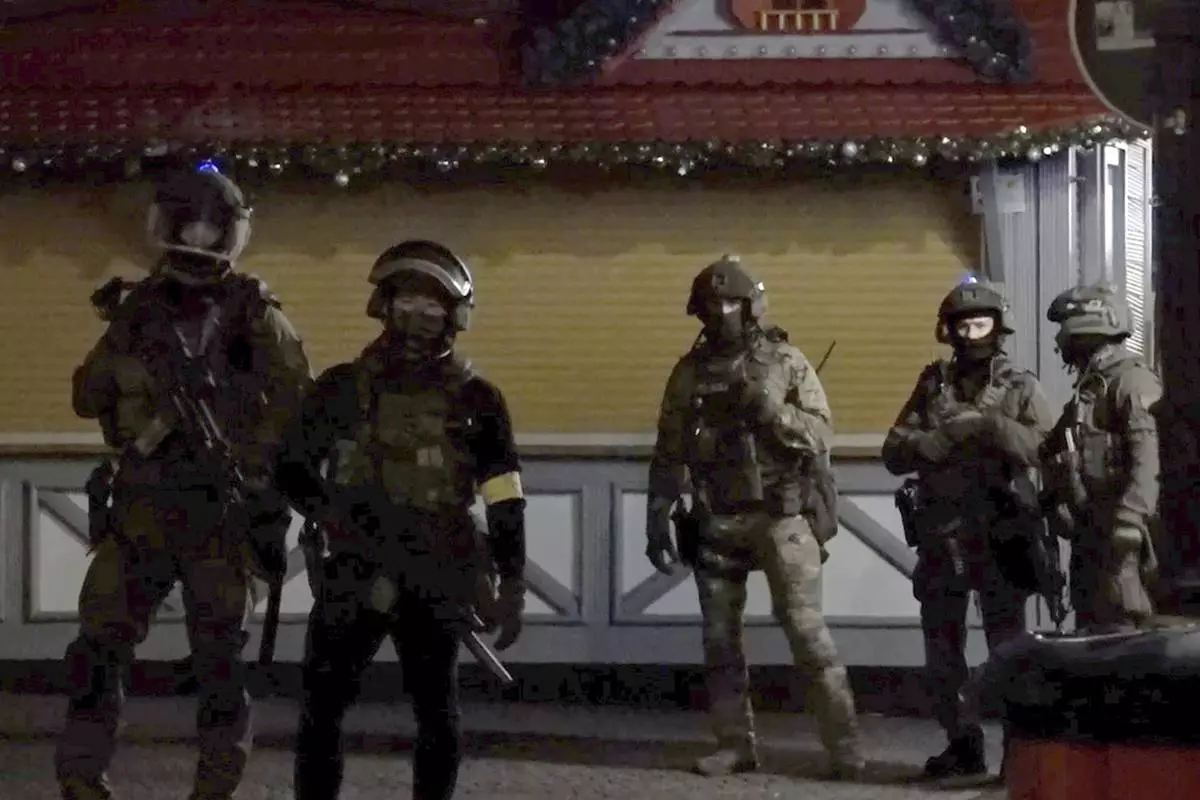
In this screen grab image from video, special police forces attend an incident at the Christmas market in Magdeburg, Germany, Friday Dec. 20, 2024. (Thomas Schulz/dpa via AP)
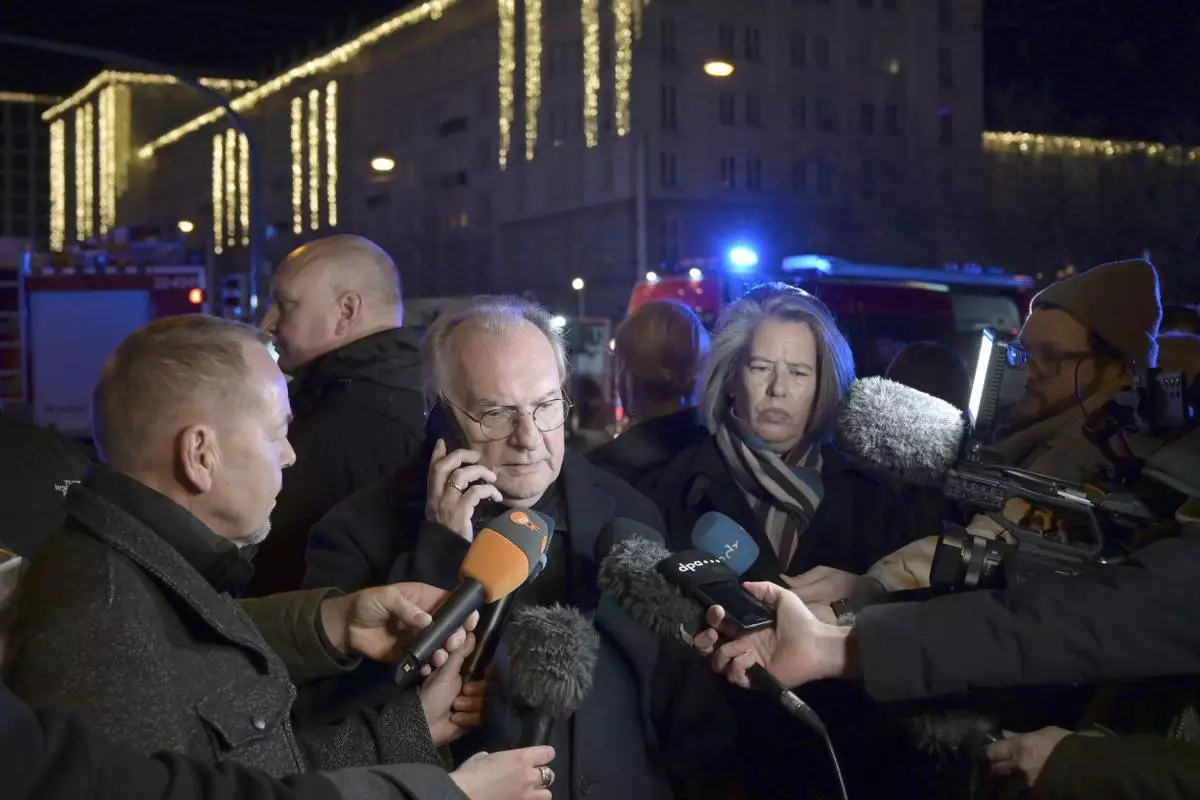
Reiner Haseloff (M, CDU), Minister President of Saxony-Anhalt, makes a statement after an incident at the Christmas market in Magdeburg, Germany, Friday Dec. 20, 2024. (Heiko Rebsch/dpa via AP)
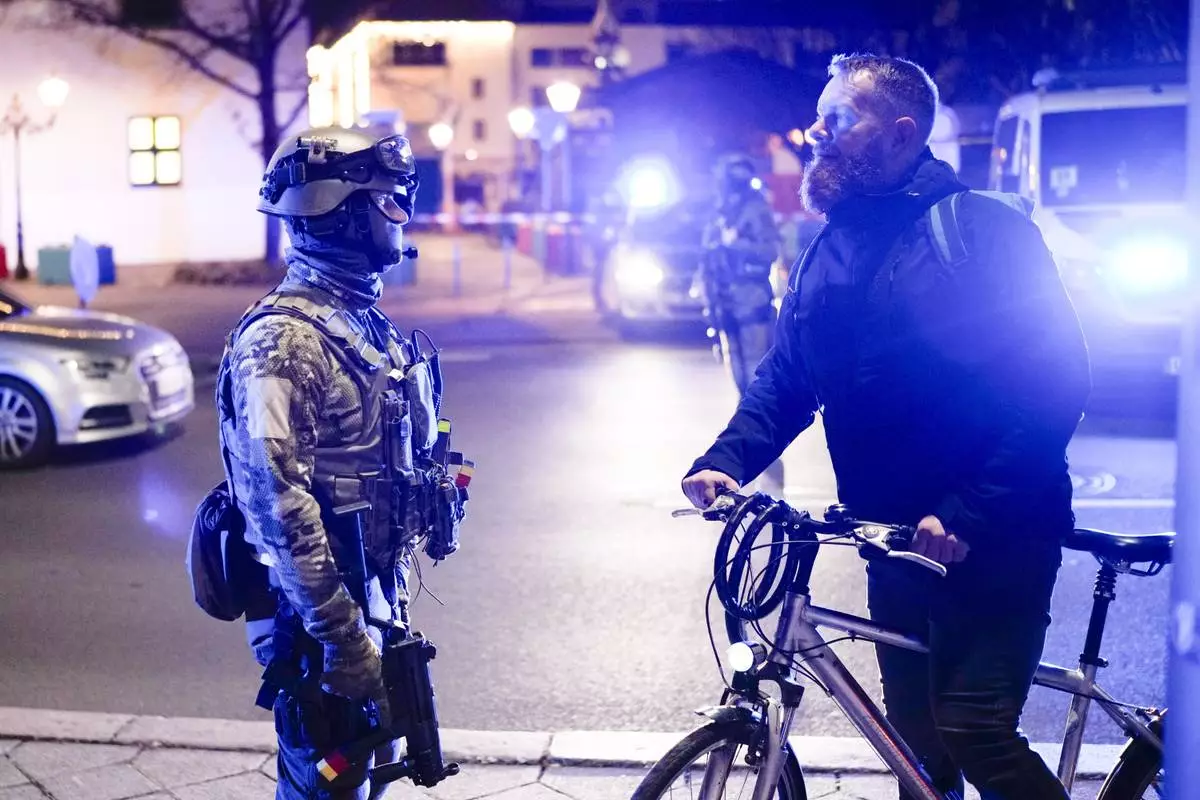
A police officer speaks with a man at a cordoned-off area near a Christmas Market after an incident in Magdeburg, Germany, Friday, Dec. 20, 2024. (AP Photo/Ebrahim Noroozi)

A policeman is seen at the Christmas market where an incident happened in Magdeburg, Germany, Friday Dec. 20, 2024. (Heiko Rebsch/dpa via AP)

A firefighter walks through a cordoned-off area near a Christmas Market, after a car drove into a crowd in Magdeburg, Germany, Saturday, Dec. 21, 2024. (AP Photo/Ebrahim Noroozi)

Emergency services work in a cordoned-off area near a Christmas Market, after an incident in Magdeburg, Germany, Friday, Dec. 20, 2024. (AP Photo/Ebrahim Noroozi)

A view of the cordoned-off Christmas market after an incident in Magdeburg, Germany, Friday Dec. 20, 2024. (Heiko Rebsch/dpa via AP)

A police officer guards at a blocked road near a Christmas market after an incident in Magdeburg, Germany, Friday, Dec. 20, 2024. (AP Photo/Ebrahim Noroozi)

The car that was crashed into a crowd of people at the Magdeburg Christmas market is seen following the attack in Magdeburg, Germany, Saturday early morning, Dec. 21, 2024. (AP Photo/Ebrahim Noroozi)

Security guards stand in front of a cordoned-off Christmas Market after a car crashed into a crowd of people, in Magdeburg, Germany, Saturday early morning, Dec. 21, 2024. (AP Photo/Ebrahim Noroozi)

Security guards stand in front of a cordoned-off Christmas Market after a car crashed into a crowd of people, in Magdeburg, Germany, Saturday early morning, Dec. 21, 2024. (AP Photo/Ebrahim Noroozi)

The car that was crashed into a crowd of people at the Magdeburg Christmas market is seen following the attack in Magdeburg, Germany, Saturday early morning, Dec. 21, 2024. (AP Photo/Ebrahim Noroozi)

Forensics work on a damaged car sitting with its doors open after a driver plowed into a busy Christmas market in Magdeburg, Germany, early Saturday, Dec. 21, 2024. (Hendrik Schmidt/dpa via AP)





